Climate Change & Jesuit Higher Education: Reportback from Loyola Chicago #6
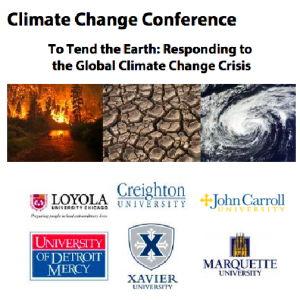
BY JAMES HUG S.J | April 23, 2015
James Hug, S.J. attended Loyola University’s Chicago’s Climate Change Conference and offered a series of reflections before, during and after the gathering which can be found here.
In previous reports to ISN, I reflected on the events of the first day and a half of the conference relating principally to fossil fuel divestment and reinvestment in clean alternative energy sources. The second afternoon featured three panels addressing climate change from the perspectives of ethics, public policy, and psychological motivation. The delay in reporting on them must be charged to the preoccupations of Holy Week (and a bad cold!). But their insights are worth returning to since they address the “perfect storm” of factors limiting the human community’s response to the critical issues of climate change.
Climate Justice
Dr. Jame Schaefer of Marquette University chaired the first panel of the afternoon, introducing Dr. William French of the Theology department at Loyola-Chicago, Dr. Lisa Sedaris of the Religious Studies department at Indiana University, and Dr. Mary Evelyn Tucker, a Senior Lecturer and Research Associate at Yale University.
French distinguished two frameworks through which to approach climate change, a Climate Justice Framework and a Climate Prudence Network. Under the rubric of climate justice, he pointed out that climate change is creating millions of climate refugees and setting off conflicts over essential resources such as water and food many places on the planet. In this situation, a small corporate and political elite profit greatly while the rest of humanity and vast numbers of other creatures suffer the impacts and pay the costs in poor health, premature death, and even species extinction. So climate justice discussions are framed to include broad justice concerns and responsibilities owed to future generations and to animal and plant species and ecosystems.
Climate change studies highlight directly how the nations that industrialized first have been pouring carbon emissions into Earth’s atmosphere a lot longer than have developing nations. Many countries are pointing out how the United States, Great Britain, Germany, and other wealthy nations have enjoyed great historic benefits from that industrial history but at the cost of being the nations most responsible for the lion’s share of climate change impacts. China has industrialized massively in the last 50 years and it now is the world’s largest contributor of annual carbon emissions, with the United States in second place. “Sadly,” French commented, “many developing nations, who bear very little responsibility for causing climate change, are experiencing some of its earliest and heaviest impacts as typhoons hit coastlines and ocean-rise begins to damage low river delta farmlands and villages.
The disproportionate role of the industrialized world in creating the looming climate change crisis points clearly to the justice imperative for that wealthy world to create a global Marshall Plan to help the poor of the world adapt to the drastic climate changes and overcome their worst impacts. The existence of large fossil fuel subsidies in the U.S. and many hidden externalities to the use of fossil fuels are strong economic justice issues that must be raised and faced as well. Did you know that global fossil fuel subsidies now amount to about $2 Trillion annually? And their supporters often argue that governments should not be interfering with market forces by subsidizing alternative clean energy sources!
Climate Change a National Security Threat
In turning to the Climate Prudence Framework, French suggested that the concepts of national security and global security need to be expanded from obsession with military and terrorist threats to include preparation for climate change. And, indeed, the U.S. Pentagon has begun to recognize the changes in climate as constituting a serious threat. U.S. citizens have long thought that it is prudent for the nation to spend immense sums to insure protection against potential national security threats. It seems to be prudent common sense, then, to use some of those resources to prevent or mitigate rising climate change threats. Now is the time to earmark some of those hundreds of billions of dollars in the military budget each year for a serious national security program to mitigate the impacts of climate change.
When the dangers of planetary destruction are so urgent and the ways forward so uncertain, Climate Prudence, which combines foresight and the courage to act in uncertain contexts, is an essential virtue.
The Power of Awe and Wonder
Dr. Lisa Sedaris suggested nurturing a sense of awe and wonder at creation as an antidote to wonder focused on ourselves and the widespread pride and arrogance about the human skills that are now threatening planetary health and wellbeing. Broadly-focused wonder can be a crucial factor in motivating ecological activism to fight against “the slow violence of climate change.”
She cited a broadened planetary perspective as another crucial element. People are often most powerful and persuasive when they talk about the things and places they consider home. At this point in history, however, we cannot let narrow notions of home (mine against yours) spawn conflicts. Planet Earth is the basic home to all living creatures we know and its survival demands a shared planetary sense of home.
Dr. Mary Evelyn Tucker commented on the encyclical letter from Pope Francis, promised for later this year. Previews suggest that it will focus on an integral ecology that attends to Earth, humanity and other creatures, justice for the poor, and peace. Earth ethics and human ethics are of one piece. Ecological integrity, social justice, and peace are all interrelated and essential.
Tucker too called for awe and wonder at the unfolding of the “cooperative universe.” She argued that humanity needs to move beyond Cartesian dualism to discover the subjectivity and interiority of all matter of which Teilhard de Chardin wrote. This type of living cosmology can transform human ways of looking on the world and living in it. It can locate the human family in a larger sacred culture and unite us with all creation.
Climate Action and Policy
The next panel set out to explore how the ethical imperatives related to climate change might be translated into public policy and other actions. Robyn Gabel, a member of the Illinois House of Representatives, began the second panel by reviewing current legislative proposals in Illinois designed to jumpstart renewable energy in the state and to meet federal energy policy goals.
Dr. Kathleen Smythe of Xavier University in Cincinnati noted that humans are biologically oriented to respond to personal threats and dangers, but have not evolved yet to respond instinctively to global threats such as climate change. She suggested three elements of the Jesuit tradition that can help people overcome that type of dissociation.
The first is a sense of wonder opening people to find God in all things, live vulnerably and with a long sense of history. The second is the moral engagement that Ignatian spirituality calls forth, prompting solidarity and political engagement to reduce destructive impacts of human actions. The third is the sense of calling or vocation that helps people pay more attention to cultural values generating climate change and crisis, values like upward mobility and unlimited and uncommitted liberty.
Smythe was followed by Mr. Dan DiLeo, a doctoral student who serves as Project Manager of the Catholic Climate Covenant. He explained the use of the St. Francis Pledge to raise awareness and to build a Catholic climate movement. He pointed to the increasingly frequent and strong papal statements on climate change and justice in recent years. He expects Pope Francis’ vision in the forthcoming encyclical to stress the goodness of all creation, humanity’s integral place in it as its “human face,” the obligation of human care for creation including a moral obligation to address climate change with both charity and justice.
Explicitly focusing on Jesuit Higher Education, DiLeo called the universities to model what they believe in both charitable and justice commitments. He suggested that the Climate Covenant resources could assist the universities in developing Clean Power Plans as well as provide campus ministries, faculty, mission officers and other administrators with materials for use on a variety of university taskforces.
He encouraged advocacy such as support for Environmental Protection Agency carbon reduction levels, attention to the ecological impact of national budget proposals, the green Climate Fund proposal and support for U.S. participation in a binding international accord to address climate change at the UN’s COP meeting in Paris later this year.
Psychology and Climate Motivation
History has shown the U.S. government to be resistant to the kinds of serious actions and policies needed in the global political arena, however. And many people are unwilling to make serious lifestyle changes for the sake of the ecology. When the facts and threats surround us, why is it so hard to motivate people to undertake the changes needed.
Dr. Susan Clayton, a Professor of Psychology who chairs the program in environmental studies at the College of Wooster and is the incoming president of the Society for the Psychological Study of Social issues, kicked off the third and final panel of the afternoon. In her analysis, it is difficult to motivate people to address climate change because it seems so big and so distant. It is not something immediately perceived or even easy to prove just by being buried under 9 feet of Boston snow.
To create a sense of connection to the issue in people, she recommended anthropomorphizing the arguments. The key, she argued, is to create a sense of emotional connection so that people will start to see themselves as part of living nature. There are many ways to do that, such as personal experiences in nature, culture, attention to our heritage, and social experiences. She had a very simple, direct and practical recommendation. If you want to create and promote connection with creation, go to the zoo. [Could Simon and Garfunkel been prophetic when they sang, “It’s all happening at the zoo!”?]
Dr. Elke Weber spoke next. She is the Jerome A. Chazen Professor if International Business and Professor of Management and Psychology at Columbia University, and is an expert on judgment and decision-making under uncertainty. She pointed out that significant behavioral changes such as those demanded by climate change do not come easily. Rational deliberation and facts do not normally bring about those changes. Emotions, associations, rules and habits guide actions. Humans are creatures of habit who learn most from experience but are often distracted from that learning by the many things demanding their attention. And many goals conflict.
In this regard, she identified climate change as “the perfect storm.” Inaction and bias for the status quo are behavioral defaults. There are also vested interests in the status quo who will attempt to deceive people in order to protect their interests. [Consider the film Merchants of Doubt.] Effective action is complicated and requires broad collaboration on matters of some uncertainty at scientific, technological, political and social levels. Denial, wishful thinking, and misperception or underestimation of climate change risks are widespread and understandable. And the risks themselves are abstract, statistical, and future while doing something to address those risks has upfront costs that are certain and unattractive today.
So what is to be done? Weber recommended turning the challenges into advantages.
- Point out that inaction and the status quo are not safe alternatives. The projected outcomes of doing nothing are becoming clearer all the time and are drastically threatening.
- Face the fact that change is coming whether we want it or not.
- Imagine a new and sustainable future that is just for all.
- In your own imagination, make “green electricity” the default option in all you say, write and do.
- Get “all hands on deck” to address the issues related to climate change: the public, CEOs, corporate board members, companies, architects/infrastructure designers, politicians, social scientists, playwrights, directors educators, students. Everyone is needed in the search for sustainable growth models, new ways of conceiving and measuring happiness, etc.
- Provide lists of effective actions.
- Focus on the positive consequences of change.
The next and final segment of this report will describe follow-up plans put together by the participants and lay out a strong and promising call to significant action.
James E. Hug, S.J., has a long history working in social ethics and social justice advocacy in the Catholic community. He served 24 years as the President of the Center of Concern, a Washington, DC based social justice institute rooted in Catholic social tradition, working for greater economic, social, and ecological justice globally. He holds a doctoral degree in Christian ethics from the University of Chicago and a master’s degree in Christian spirituality from St. Louis University.
Fr. Hug’s research has focused on issues of faith and economic justice and he has lectured and directed workshops throughout the U.S. and in Europe, Asia, Africa, and Australia. Currently he serves as sacramental minister for the Adrian Dominican Sisters and writes on issues of spirituality for social transformation in these difficult times. His blog, “Truth that does Justice,” can be found on the website for the Dominican Center: Spirituality for Mission, www.dominicancenter.org.
Past publications have included Catholic Social Teaching: Our Best Kept Secret, Social Revelation: Profound Challenge for Christian Spirituality, and Tracing the Spirit: Communities, Social Action, and Theological Reflection. Jim has also written chapters for Globalization and Catholic Social Thought: Present Crisis, Future Hope and The Pastoral Circle Revisited: A Critical Quest for Truth and Transformation.
Fr. Hug’s research has focused on issues of faith and economic justice and her has lectured and directed workshops throughout the U.S. and in Europe, Asia, Africa and Australia. He was the editor of the Center of Concern’s “Catholic Social Teaching: Our Best Kept Secret, author of Social Revelation: Profound Challenge for Christian Spirituality,” and the editor of “Tracing the Spirit: Communities, Social Action, and Theological Reflection.” Jim has also written chapters for “Globalization and Catholic Social Thought: Present Crisis, Future Hope” and “The Pastoral Circle Revisited: A Critical Quest for Truth and Transformation.”

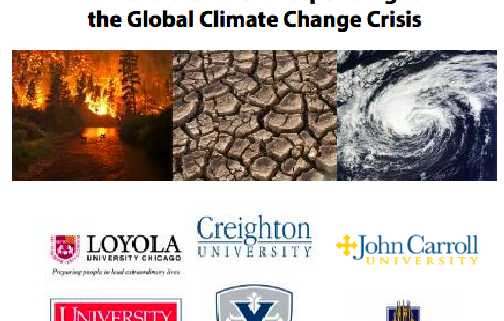
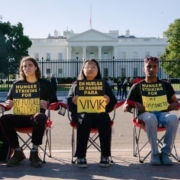
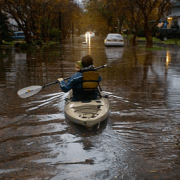
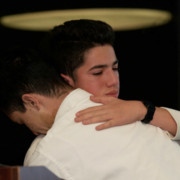

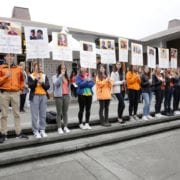
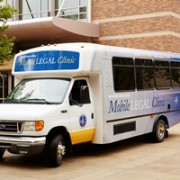



Leave a Reply
Want to join the discussion?Feel free to contribute!